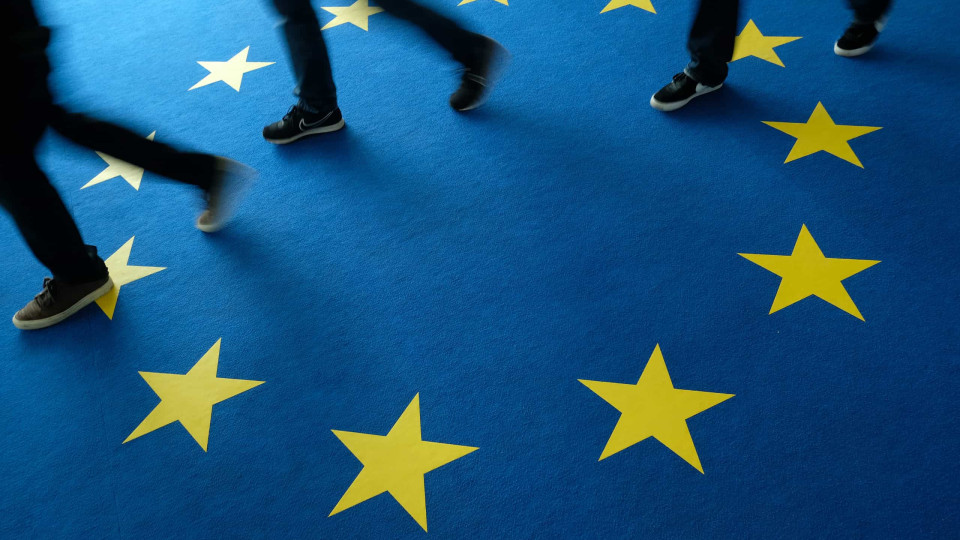Freedom of expression in debate on the European elections. What was said?
Chega, IL and CDU rejected today the imposition of limits to freedom of speech, differing in the solutions to combat misinformation, and PAN defended the need for a “red line” regarding hate speech.

© Getty Images

Política Eleições Europeias
The top candidates from Chega, Iniciativa Liberal, CDU (a coalition of PCP and PEV), and PAN faced off today in the fourth televised debate before the European elections of June 9, broadcast on SIC and SIC Notícias.
The fight for freedom of expression and the fight against disinformation was one of the topics addressed, with the PAN candidate defending investment in "innovation and technology", including the use of artificial intelligence, to "discover, monitor, and stop all this disinformation, much of it created by the far right".
Asked how it is possible to ensure a balance between freedom of expression and the fight against disinformation, Pedro Fidalgo Marques considered that "there has to be a red line in hate speech, because hate speech kills".
"We have to ensure that hate speech, discriminatory speech, speech that puts minorities, people, sectors, whatever, behind and aside, is not propagated", he specified.
The top candidate from Chega defended that "freedom of expression cannot have limits, there are no lines, either there are or there aren't".
António Tânger Corrêa complained that Chega's discourse is seen as "bad, it has to be attacked, ostracized", criticized those who want to set red lines, and considered that this attitude constitutes "a hate speech".
Pointing out that "majorities cannot be questioned by minorities", the candidate stated that "minorities are taking over political discourse and social narrative" with "woke agendas and other types of radicalism that are harmful to the evolution of democracies".
For IL, João Cotrim de Figueiredo warned that one can "run the risk of limiting people's expression in the name of fighting disinformation".
The liberal candidate considered that the solution is to "invest much more heavily in open discourse about what information is circulating, in fact checking, which has played a crucial role in unmasking disinformation and in technology".
The top candidate from CDU defended that the fight against disinformation and fake news involves "deepening democracy" and empowering citizens "to be full-fledged and critical people, capable of reflecting on the world around them", and rejected "censorship, the limitation of individual rights and social rights".
"Even the fact-checking solution doesn't solve much, it's a secretariat of state for truth", criticized João Oliveira.
In this debate, the candidates also showed their views on Defense and the war in Ukraine.
The top candidate from CDU considered that "the world already spends too much money on weapons, it would be necessary to spend more money on peace" and that "diverting resources to the defense industry" is "accentuating the dangers of war".
Asked if Russia winning the war poses a threat to Europe, he replied: "I believe in Russia's plans to control Europe as much as I believe in Iraq's weapons of mass destruction, that's a discourse to fuel the war".
João Cotrim de Figueiredo classified this view as "lyrical and irresponsible".
"As long as there are tyrants and tyrants, imperialists, aggressors, bloodthirsty, willing to sacrifice their people and others for personal missions in the European and world space, the democratic and free world has an obligation to defend itself", stressed the IL candidate.
António Tânger Corrêa stated that "Chega has never been pro-Russia", despite being part of a European political family made up of several parties that are, and first indicated that the party's position "initially" will be to support Ukraine, later guaranteeing that "they can count on Chega to defend Ukraine with all their might".
For PAN, Pedro Fidalgo Marques defended that Europe must be prepared, support Ukraine, and that there should be "multinational rapid intervention forces", rejecting a single European army.
The top candidate also proposed an "extraordinary contribution on the excessive profits of the defense industry that allows for humanitarian and environmental support" to that country.
Read Also: From "minorities" to "friendship" with Putin. Disinformation and war in debate (Portuguese version)


Descarregue a nossa App gratuita.
Oitavo ano consecutivo Escolha do Consumidor para Imprensa Online e eleito o produto do ano 2024.
* Estudo da e Netsonda, nov. e dez. 2023 produtodoano- pt.com



